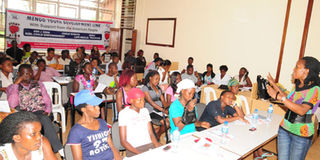Activists go to court as call raises for equal rights for people with HIV/Aids

Public awareness messages, voluntary testing, and sensitisation campaigns are some of the ways in which the HIV/Aids epidemic is being countered in Uganda.
HIV/Aids activists delegations comprising policy makers, medical practitioners, researchers, sex workers and other key stakeholders converged in Durban, South Africa, last month for this year’s International Aids Conference.
The conference was geared towards forging ways and sharing knowledge on new developments and what ought to be done to reduce new infections as well as sharing experiences and analysing statistics related to the HIV/Aids trend.
The five-day conference, which kicked off on July 18, was marked under the theme “Access Equity Rights Now”.
Back in the country, in a bid to step up activism and rhyme with this year’s theme, HIV/Aids activists called on the government to implement the right to equity.
Taking to court
More than 100 civil society groups led by the Uganda Network on Law, Ethics, and HIV (UGANET) reiterated calls to have some of the clauses in the controversial HIV/Aids Prevention and Control law repealed saying they are discriminatory and unconstitutional.
This time they did not petition President Museveni, or other implementing agencies having been frustrated several times before, but the Constitutional Court.
They are asking the court to quash some provisions in the HIV/Aids law they say are unconstitutional and promote discrimination and stigmatisation of those with the disease.
One of the contested clauses allows medical practitioners to disclose a client’s HIV status to others.
The law would according to activists contravene the right for HIV positive people to keep their status confidential and would in essence promote stigma while criminalisation of the spread would keep away people from testing.
The same activists in May 2014 strongly opposed certain sections days after Parliament had passed the Bill into law.
They included the Human Rights Watch, Health Global Advocacy Project and the Uganda Network on Law and Ethics and HIV/Aids (UGANET) who said it is “deeply flawed” and promotes “discrimination”.
They later sought the attention of President Museveni asking him not to assent to the law although this did not stop him from doing so. However, the President assented to the law on July 31, 2014.
According to statistics released by the ministry of Health last year, the number of people starting anti-retroviral treatment (ART) in Uganda stood at 713,744.
In just three months, between June and September 2014, a total of 33,744 people enrolled for HIV/Aids treatment, raising the overall number from the previous 680,000 to the above-mentioned number (713,744).
The drugs suppress HIV multiplication in the body.
Activists, however, say that the hardline approach to prevention of HIV/Aids spread has instead discouraged those living with HIV from voluntary testing for fear of victimisation.
Infringment on rights
According to the activists, some clauses were passed without the amendments sought by an all-encompassing network.
Prosper Byonanebye, UGANET head of programmes, says: “The petition among others challenges section 18 (e), on ‘Disclosure of one’s HIV status to undisclosed parties. This is overly-broad, vaguely worded and thus unclear.
It also raises legality questions and infringes on the right to privacy. Same as Section 41 of the HIV prevention and Control Act on attempted transmission which is subject to misuse and can be a ticket to punish innocent Ugandans by self-seekers because it is not specific and it’s difficult to define.
According to Byonanebye, some of the clauses infringe on the right to equality and right to dignity and worsens discrimination hence pushing people living with HIV into hiding instead of the intended policy objective of supporting more of them to disclose as has been the case.
Chapter four of the Constitution emphasises the promotion and protection of several human rights and freedoms by the state including equality and freedom from discrimination (Article 21), right to dignity (Article 24) and right to privacy ( Article 27) among others.
Arguments for the Act
On disclosure of one’s status to other people, Maj (Rtd) Rubaramira Ruranga, a leading HIV/Aids advocate, however tows a different line.
He stresses the need for HIV positive people to open up about their status if solutions are to be found.
“Methodology is what we need to look into to find solutions to the wide spread of HIV/Aids and stigma, which is closely related to HIV/Aids. If we had a method of going house to house and educate the masses about the dangers of HIV and the need to know their status, the infection rate would be reduced. If we test from house to house, we would get rid of stigma,” he says.
“I no longer believe in confidentiality because people have continued to sleep with each other without bothering about the need to test. We should stop hiding something which can be served better Let us fight the conspiracy of the unknown.”
Commenting about the intentional spread of HIV/Aids, Maj Ruranga backs the proposal saying it will go a long way in protecting innocent Ugandans from selfish offenders who knowingly conceal their results away from their partners and infect them with HIV/Aids.
He noted: “Not everybody is bad but there are those spreading HIV intentionally. We do work with a team of young people but we have discovered that some health workers are giving false results at a request.
People know that they are reactive but ask for non-reactive results. I have arrested some and we are still arresting many. What other method is workable other than the law? Let the activists prove beyond reasonable doubt that this law will not work.”
Maj Ruranga adds that the country has lived with the deadly disease for over two decades and it has continued to spread.
“We have become so negligent as a result of pampering certain things. Why should the virus continue spreading? My coming out helped so many. Why do people continue hiding? We need to get out of this and find a solution.”
He emphasises the use of condoms as a preventive measure to guard against HIV/Aids as he opposed calls from the South African conference pushing for PEP to be given to the youth free of charge as a way of guarding against the spread of HIV.
“The public should not buy medicine to give to the young people to play sex anyhow,” he argues.
At the height of debate on the Bill in 2014, government appealed to the activists to discuss it in its entirety and its intentions before their objections.
Dr Ruhakana Rugunda, who was then the minister of Health, urged the activists to remain firm since the law comes with positive attributes.
“We shall do everything possible to avoid anything that stigmatises people in the course of implementation of the law,” Dr Rugunda said in 2014.
The Bill that was passed into law establishes a special fund, the National HIV Fund where resources to finance people with HIV would be pooled.
The permanent secretary of ministry of Health, Dr Asuman Lukwago, when commenting about activists’ decision to go to court, said they will be listened to if they follow the formal procedures.
“We will discuss with them and government takes note of both the state and non-state actors. If we both concur that there was an error, the contested clauses can be repealed,” he said.
“They (activists) should therefore do it in a formal way and contact the Attorney General and the Solicitor General, who will tell us what to do next. Otherwise they have to be listened to since the issues they are raising are of public concern,” said the doctor
About the law
The HIV law, a private members’ initiative, was tabled before Parliament by legislators on the Parliamentary HIV/Aids Committee during the 8th Parliament in 2010.
The Bill was premised on the fact that whereas Uganda won many accolades when it reversed the HIV prevalence rate from 18.5 per cent in the early 1990s to 6.2 per cent in 2003, recent studies from the ministry of Health’s Sero Behaviour Survey (2011) and the Unaids Epidemic Update (2012) indicate that HIV prevalence is on the rise from 6.4 per cent in 2005 to 7.2 per cent in 2011.
While government, in 2009, embraced a policy of universal access to ARVs, the number of people who were eligible for ARVs was 540,094 out of which only 48 per cent were receiving treatment leaving out 52 per cent.
Clauses under contest
The activists are particularly opposed to section 18 of the HIV Act and according to their arguments; the clause undermines public health objectives of HIV prevention and control and also contravene the national guiding principles of public policy.
To them the section is discriminatory and negatively impacts on the lives of people living with HIV/Aids hence discoursing voluntary testing of HIV and increasing its spread.
sections 18(2)(e) and (h), 41 and 43(1)of the HIV and Aids prevention and control Act No of 2015 undermines the public health objectives of HIV prevention and control and contravenes objective XIV (b) of the National Guiding Principles of Public Policy and Articles 8A, 45, 287 and 2(1) and (2) of the Constitution.
Clause 18 legislates for disclosure of release of HIV results.
But clause 18(2) outlines circumstances under which results of an HIV test may be disclosed or released.
The results may be released to a parent or guardian of a minor, a parent or guardian of a person of unsound mind, a legal administrator or guardian, with the written consent of the person tested and to a medical practitioner or other qualified officer who is directly involved in the treatment or counselling of that person, where the HIV status is clinically relevant.
But to the contrary, HIV results are supposed to be confidential and can only be released to a person that has been tested.
“It is obvious that disclosing one’s status or allowing the disclosure or release of results of an HIV positive person to a broad range of unidentified persons will undermine the right to privacy. This right to privacy is very crucial when it comes to HIV testing,” says Ms Dorah Kiconco, the Executive Director, UGANET.
Article 43(1) of the law says a person who willfully and intentionally transmits HIV to another person commits an offence and on conviction shall be liable to a fine of not more than one hundred and twenty currency points or to imprisonment for a term of not more than ten years or both.
Under Clause 41, a person who attempts to transmit HIV to another commits a felony and upon conviction be liable to imprisonment of not more than five years.




